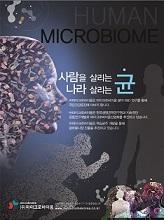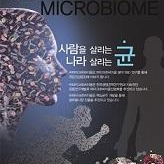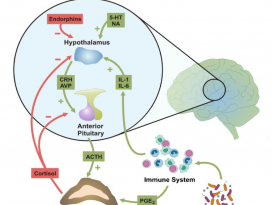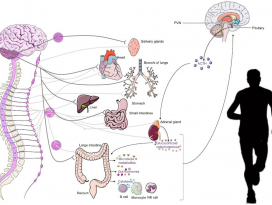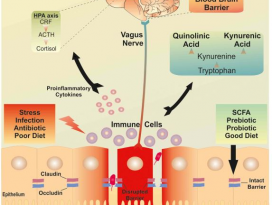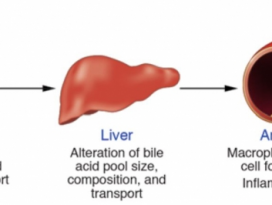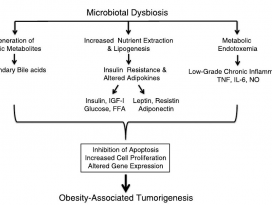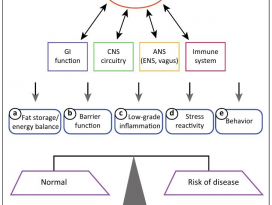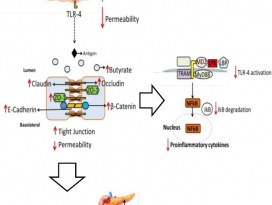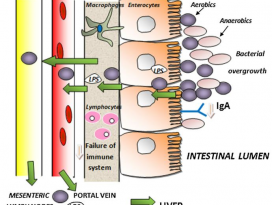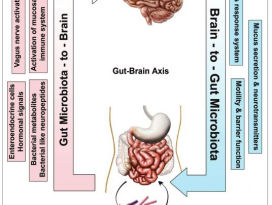[Gut Microbiome] Exposure to a social stressor alters the structure of the intestinal microbiota: Implications for stressor-induced immunomodulation
- e 1802
Exposure toa social stressor alters the structure of the intestinal microbiota: Implicationsfor stressor-induced immunomodulation
Michael T. Bailey, Scot E. Dowd , Jeffrey D. Galley,Amy R. Hufnagle, Rebecca G. Allen, Mark Lyte
Division of Oral Biology, College of Dentistry, TheOhio State University, Columbus, OH 43210, United States; Institute forBehavioral Medicine Research, College of Medicine, The Ohio State University, Columbus,OH 43210, United States; Research and Testing Laboratory and Medical BiofilmResearch Institute, Lubbock, TX 79407, United States; Integrated BiomedicalScience Graduate Training Program, College of Medicine, The Ohio StateUniversity, Columbus, OH 43210, United States; Department of Pharmacy Practice,School of Pharmacy, Texas Tech University Health Sciences Center, Lubbock, TX79430, United States
| Abstract The bodies of most animals are populated by highly complex and genetically diverse communities of microorganisms. The majority of these microbes reside within the intestines in largely stable but dynamically interactive climax communities that positively interact with their host. Studies from this laboratory have shown that stressor exposure impacts the stability of the microbiota and leads to bacterial translocation. The biological importance of these alterations, however, is not well understood. To determine whether the microbiome contributes to stressor-induced immunoenhancement, mice were exposed to a social stressor called social disruption (SDR), that increases circulating cytokines and primes the innate immune system for enhanced reactivity. Bacterial populations in the cecum were characterized using bacterial tag-encoded FLX amplicon pyrosequencing. Stressor exposure significantly changed the community structure of the microbiota, particularly when the microbiota were assessed immediately after stressor exposure. Most notably, stressor exposure decreased the relative abundance of bacteria in the genus Bacteroides, while increasing the relative abundance of bacteria in the genus Clostridium. The stressor also increased Circulating levels of IL-6 and MCP-1, which were significantly correlated with stressor- induced changes to three bacterial genera (i.e., Coprococcus, Pseudobutyrivibrio, and Dorea). In follow up experiments, mice were treated with an antibiotic cocktail to determine whether reducing the microbiota would abrogate the stressor-induced increases in circulating cytokines. Exposure to SDR failed to increase IL-6 and MCP-1 in the antibiotic treated mice. These data show that exposure to SDR significantly affects bacterial populations in the intestines, and remarkably also suggest that the microbiota are necessary for stressor-induced increases in circulating cytokines. |
제목
사회적 스트레스 요인에 대한 노출은 장내 미생물의 구조를 변화시킨다: 스트레스유발 면역 조절에 대한 시사점
내용
대부분의 동물의 신체에는 매우 복잡하고 유전적으로 다양한 미생물 군집이 존재한다.이 미생물군의 다수는 숙주와 적극적으로 상호작용하는, 대단히 안정적이면서도 동적인 대화형 최종 군락(climax communities)을 형성하며 장내에 거주한다. 본 연구실에서 행해진 연구에 따르면 스트레스 노출(stressor exposure)은미생물의 안정성에 영향을 미치고 세균 전이를 유도한다. 그러나 이러한 변화의 생물학적 중요성은 잘 알려져있지 않다. 미생물이 스트레스에 의해 유발된 면역 증강에 기여하는지 여부를 결정하기 위해, 순환 성 사이토카인(Cytokines)을 증가시키고 선천성 면역시스템을 강화하여 반응성을 향상시키는 사회적 분열(SDR; Social Disruption)이라고 불리는사회적 스트레스 요인에 쥐를 노출시켰다. 맹장 내 세균 증식(Bacterialpopulations)은 세균성 태그로 암호화된 ‘FLX 앰플리콘 파이로시퀀싱(FLX amplicon pyrosequencing)’을사용하여 특성화 되었다. 스트레스 노출은 미생물이 스트레스에 노출된 직후에 평가되었을 때 특히 미생물환경 구조를 크게 변화시켰다. 가장 두드러지는 점은, 스트레스요인 노출은 박테로이데스(Bacteroides)속(genus)에 속하는 세균의 상대적 풍부함을 감소시키는 반면, 클로스트리듐(Clostridium)속의 세균의 상대적 풍부함은 증가시켰다. 스트레스 요인은 또한 코프로코쿠스(Coprococcus), 슈도부틸비브리오(Pseudobutyrivibrio),도레아(Dorea)의3가지 속에 대한 스트레스에서 유도된 변화와 유의한 상관관계가 있는IL-6 및 MCP-1의 순환 수준을 증가시켰다. 후속실험에서, 미생물을 줄이는 것이 순환성 사이토카인의 스트레스 유발 증가를 억제하는지 여부를 결정하기위해 쥐를 항생제 칵테일(antibiotic cocktail)로 처리하였다. SDR에 노출되면 항생제 치료를 받은 쥐는 IL-6와 MCP-1을 증가시키지 못했다. 이러한 데이터는 SDR에 대한 노출은 장내 미생물군에 상당한 영향을 미치며, 또한순환성 사이토카인의 스트레스 유발 증가에 필수적임을 중요하게 시사한다.
Keywords
: #SocialStress#StressorExposure #ExposureToStress #SocialDisruption #SDR #Stressor-Induced #GastrointestinalMicrobiota#Microbiome # Microorganisms #Microbes #GutMicrobiome #GutMicrobiota#BacterialTranslocation#Pyrosequencing #Inflammation #Immunomodulation #Cytokines #CirculatingCytokines#Bacteroides #Clostridium
#사회적스트레스 #스트레스노출 #사회적파괴 #사회적분열 #스트레스유발 #스트레스유도성 #마이크로바이옴 #장내미생물 #장내미생물총 #장내미생물군 #세균전이 #파이로시퀀싱 #염증 #면역조절 #면역제어 #면역조정 #사이토카인 #순환성사이토카인 #순환사이토카인 #박테로이데스 #클로스트리듐
[출처: Bailey, M. T., Dowd, S. E., Galley, J. D., Hufnagle, A. R., Allen,R. G., & Lyte, M. (2011). Exposure to a social stressor alters thestructure of the intestinal microbiota: Implications for stressor-inducedimmunomodulation. Brain, Behavior, and Immunity, 25(3), 397–407.]
|
| ㈜마이크로바이옴 ㈜마이크로바이옴은 생명공학 최고의 기술력을 바탕으로 마이크로바이옴 산업의 성장과 발전의 선도적 역할을 하고 있는 대한민국 대표 마이크로바이옴 R&D 전문 기업입니다. ㈜마이크로바이옴은 생명공학 국가연구기관인 한국생명공학연구원과 마이크로바이옴 관련 상품에 대하여 공동연구개발 및 기술이전을 통하여 공동특허 출원과 마이크로바이옴 상품화에 성공하였고, 마이크로바이옴 글로벌 기업이 되기 위하여 연구개발을 지속하고 있습니다. |
| no. | 제목 | 조회수 |
|---|
㈜마이크로바이옴 ㅣ 서울시 서대문구 연희로 77-12 영화빌딩2층
Tel :02-322-0302 l Fax : 02-322-0759
Copyright (c) Microbiome. Co. All Rights Reserved.
